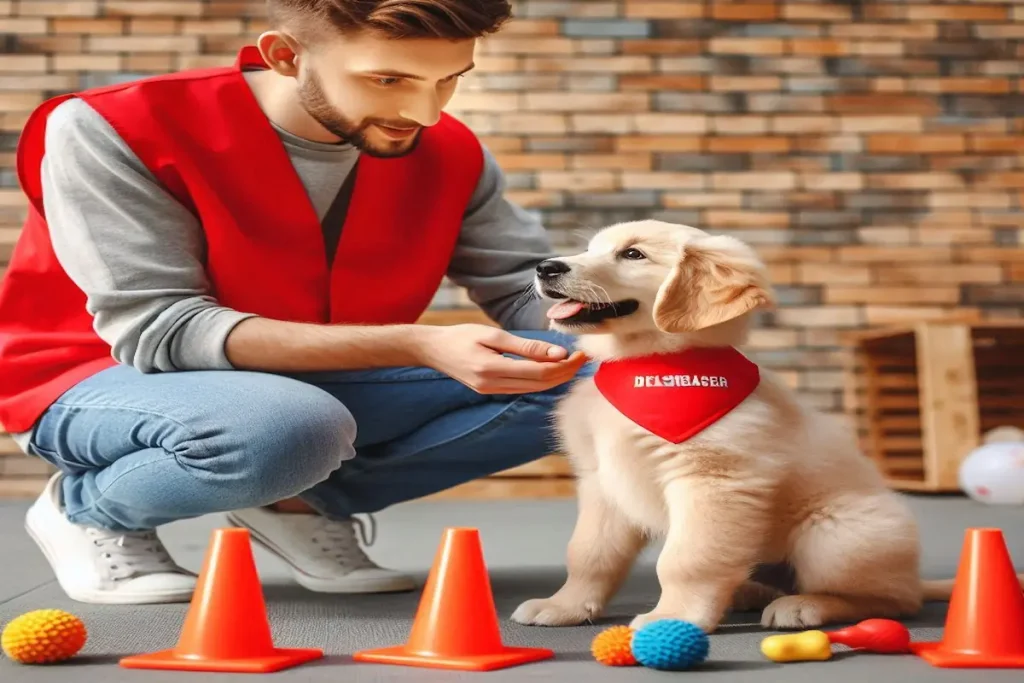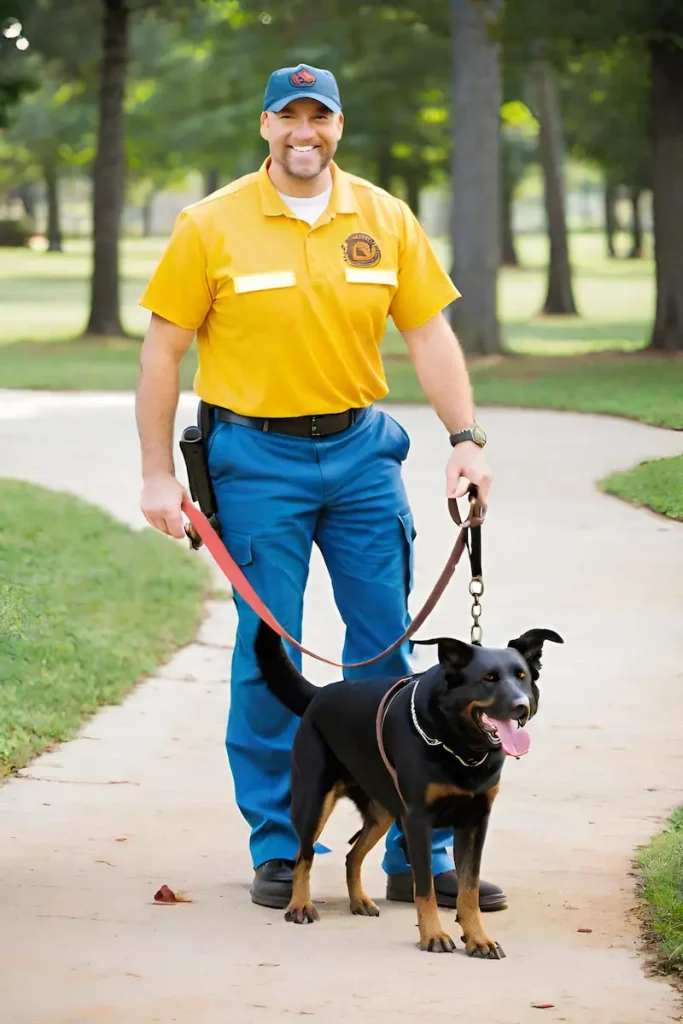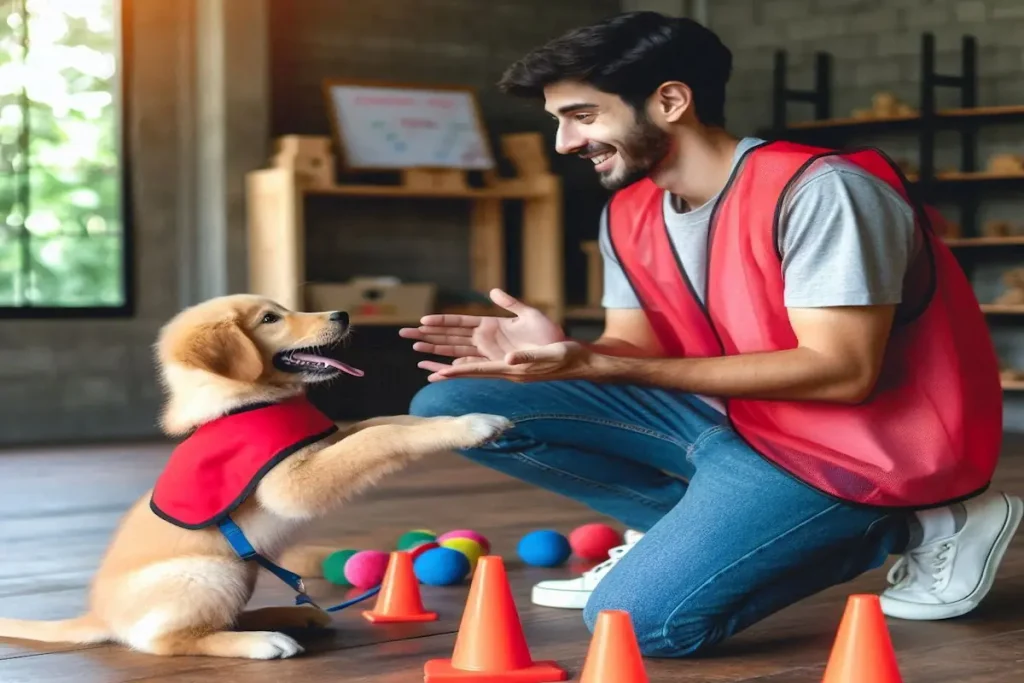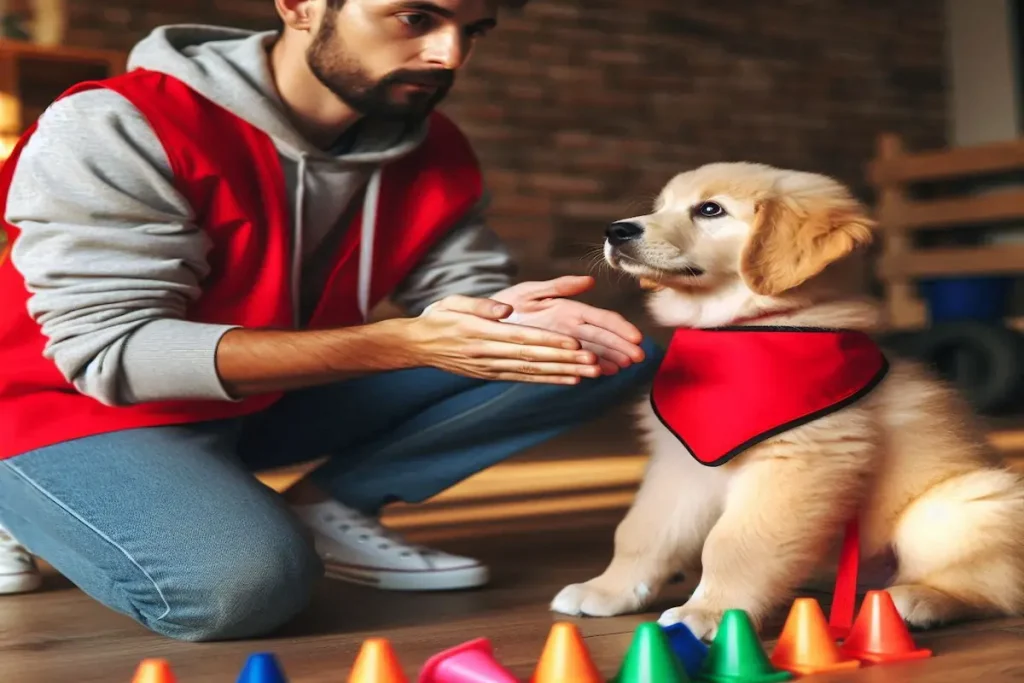Dog Training Near Me
Introduction
If you’re a dog owner, you’ve probably wondered, “Where can I find dog training near me?” Finding the right trainer for your dog can make a world of difference in your pet’s behavior and your relationship with them. Whether you’re dealing with a rambunctious puppy or an older dog with behavioral issues, a local dog trainer can provide the guidance you both need. In this article, we’ll explore everything you need to know about finding and choosing the right dog training services near you.
Why Local Dog Training Matters

Local dog training offers convenience, community, and consistency. By choosing a trainer near you, you’ll have the benefit of regular, in-person sessions that fit into your schedule without the hassle of long commutes. Plus, many local trainers are familiar with the specific needs and behaviors common to dogs in your region, whether it’s urban distractions or wildlife encounters.
Related: Essential Dog Training Words Every Owner Should Know
Types of Dog Training Services Available Locally

When searching for “dog training near me,” you’ll likely come across a variety of options. Understanding these options will help you decide which one fits your dog’s needs:
- Basic Obedience: Teaching foundational commands like sit, stay, come, and heel.
- Behavior Correction: Addressing specific issues such as aggression, fear, or separation anxiety.
- Puppy Training: Focuses on early socialization, housebreaking, and basic manners.
- Advanced Training: For dogs that have mastered basic obedience and are ready for more complex commands or agility training.
Group Classes vs. Private Training
Both group classes and private training sessions have their benefits. Deciding which one is right for you depends on your dog’s personality and your personal preferences.
- Group Classes: Great for socialization and learning in a group environment. They are often more affordable and help dogs learn to focus around distractions.
- Private Training: Ideal for dogs with specific behavioral issues or if you prefer one-on-one attention. Private sessions allow the trainer to tailor the lessons to your dog’s needs.
How to Choose the Right Dog Trainer
Choosing the right trainer is crucial to your dog’s success. Here’s what to look for when selecting a dog trainer near you:
- Experience: How long has the trainer been working with dogs? Do they have experience with your dog’s breed or specific behavioral issues?
- Training Methods: Does the trainer use positive reinforcement, or do they rely on outdated punishment-based methods?
- Certifications: Look for trainers who are certified by reputable organizations like the Association of Professional Dog Trainers (APDT).
Basic Obedience Training

If your dog is just starting out, basic obedience classes are a must. These courses typically cover essential commands such as:
- Sit: Teaching your dog to sit on command.
- Stay: Training your dog to stay in place until released.
- Come: Ensuring your dog reliably returns to you when called.
- Heel: Walking calmly on a leash without pulling.
These classes lay the foundation for good behavior both at home and in public.
Related: How to Train Your Dog: Essential Tips for Pet Owners
Puppy Training Programs

Puppy training programs focus on the critical early stages of a dog’s life. These classes help young dogs develop good habits and prevent unwanted behaviors before they start. Key elements of puppy training include:
- Socialization: Introducing your puppy to other dogs, people, and new environments.
- Housebreaking: Teaching your puppy where and when to go potty.
- Basic Manners: Learning not to jump, chew, or bite.
Enrolling in a puppy training class early ensures your dog gets off to the best possible start.
Advanced Dog Training Classes
For dogs that have mastered the basics, advanced dog training classes offer more challenging exercises and new skills. These classes might include:
- Agility Training: Teaching your dog to navigate obstacles like tunnels, jumps, and weave poles.
- Off-Leash Commands: Ensuring your dog obeys commands even when not on a leash.
- Trick Training: Teaching fun tricks like rolling over, playing dead, or fetching specific items.
Advanced training keeps your dog mentally stimulated and strengthens your bond.
Behavior Modification and Problem-Solving
Is your dog dealing with aggression, separation anxiety, or excessive barking? Local trainers often offer specialized behavior modification services to address these issues. Working one-on-one with a trainer can help you identify the root cause of the behavior and develop a plan to correct it.
Training Methods: Positive Reinforcement vs. Other Approaches
There are many dog training methods, but positive reinforcement is widely considered the most effective and humane. Trainers who use positive reinforcement reward good behavior with treats, praise, or play, rather than punishing bad behavior. This method helps dogs learn faster and builds trust between you and your pet. Be wary of trainers who rely on harsh corrections or punishment-based techniques, as these can lead to fear and anxiety.
Related: Advanced Dog Training Exercises: Elevate Your Pup’s Skills
In-Home Training Options
In-home dog training provides personalized sessions in the comfort of your home. This is a great option for dogs that may feel anxious or distracted in a class setting. In-home training is especially useful for addressing issues that occur in specific environments, such as housebreaking or barking at the door.
Dog Socialization Classes
Socialization is a critical part of dog training, especially for puppies. Many local trainers offer group socialization classes, where dogs can interact in a controlled, supervised environment. These classes help your dog learn how to play nicely with others and behave appropriately around different people, dogs, and environments.
How Much Does Dog Training Cost?
The cost of dog training services can vary depending on the type of training and the trainer’s experience. On average:
- Group Classes: $100 to $200 for a series of 6-8 sessions.
- Private Lessons: $50 to $120 per hour, depending on location and trainer qualifications.
- In-Home Training: $75 to $150 per hour.
While training may seem expensive, it’s an investment in your dog’s future behavior and happiness.
Training for Specific Breeds
Certain dog breeds have specific training needs due to their natural instincts and characteristics. For example:
- Herding breeds (e.g., Border Collies): These dogs need plenty of mental stimulation and thrive in agility training.
- Hound breeds (e.g., Beagles): Hounds can be independent, so patience and consistency are key.
- Toy breeds (e.g., Chihuahuas): Small dogs often benefit from confidence-building exercises.
A local trainer familiar with your breed can tailor the training to your dog’s needs.
The Importance of Ongoing Training
Training doesn’t end after your dog completes a course. Ongoing training is essential for reinforcing good behavior and introducing new skills. Regular practice, whether through refresher courses or advanced classes, ensures your dog stays sharp and well-behaved.
Finding the Best Reviews for Local Trainers
Before choosing a trainer, it’s important to do some research. Look for online reviews from other pet owners in your area, and ask for recommendations from friends, family, or your veterinarian. Pay attention to feedback about the trainer’s professionalism, the effectiveness of their methods, and the progress other dog owners have seen in their pets.
Questions to Ask Before Enrolling
Before enrolling in a dog training course, here are some important questions to ask:
- What training methods do you use?
- Do you offer any guarantees or follow-up support?
- How many dogs are in each class?
- Can you provide references or testimonials from past clients?
Asking these questions ensures that you find a trainer who meets your expectations and uses humane, effective methods.
The Role of Certification in Choosing Trainers
While certification isn’t required to be a dog trainer, it’s a good sign that the trainer has undergone formal education and adheres to a code of ethics. Look for trainers certified by organizations such as the International Association of Canine Professionals (IACP) or the Certification Council for Professional Dog Trainers (CCPDT).
How Training Strengthens Your Bond with Your Dog
Training is more than just teaching commands—it’s about building a strong, trusting relationship with your dog. When you train together, you’re learning to communicate better, and your dog learns to look to you for guidance. This bond will last a lifetime, creating a happier and more fulfilling relationship with your furry friend.
Conclusion
Finding the right dog training near you is a key step toward ensuring your dog’s happiness and well-being. Whether you’re starting with basic obedience or looking to tackle specific behavioral issues, local trainers offer a range of services to meet your dog’s needs. By investing in professional training, you’re setting your dog up for a lifetime of good behavior and deepening the bond between you and your pet.
FAQs: Dog Training Near Me
Q1: How can I find dog training near me?
A: You can search online, ask for recommendations from local pet owners, or check with your vet for trusted local trainers.
Q2: How often should I take my dog to training?
A: Most basic obedience classes meet once a week for 6-8 weeks. For private lessons, frequency can be adjusted based on your dog’s progress.
Q3: Can older dogs still be trained?
A: Yes! While puppies are easier to train, older dogs can learn new behaviors with patience and consistent training.
Q4: What should I bring to a dog training class?
A: Bring treats, a leash, and any training tools requested by the trainer, such as a clicker or specific collars.
Q5: What is the most effective dog training method?
A: Positive reinforcement is considered the most effective and humane method, focusing on rewarding desired behavior rather than punishing bad behavior.

